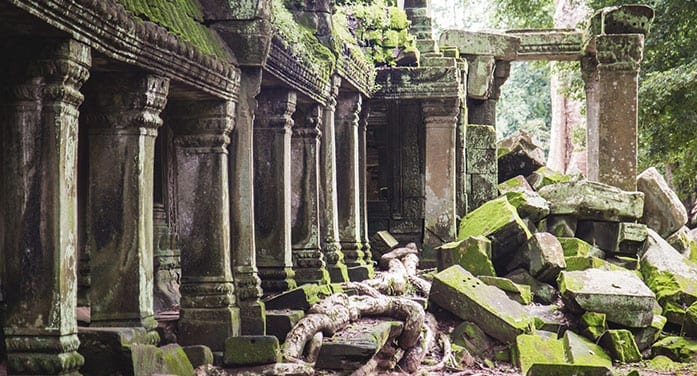 Could Canada soon meet its end, given its many divides and increasing public debt?
Could Canada soon meet its end, given its many divides and increasing public debt?
If Sir John Glubb is right, the answer is yes.
Glubb’s 1976 work, The Fate of Empires and Search for Survival, found surprising commonalities in the rise and fall of 11 historic empires. Although they spanned 3,000 years and varied geography, each empire went through the same stages in roughly the same amount of time.
Canada, having taken the same path, has but one final hope.
Glubb wrote that empires start with an “outburst” led by pioneers. They “abound in courage, energy and initiative, [and] overcome every obstacle … penetrating new forests, climbing unexplored mountains, and sailing uncharted seas. The new nation is confident, optimistic and perhaps contemptuous of the ‘decadent’ races which it has subjugated.”
If that doesn’t sound like pre-Confederation Canada, what would?
The ages of pioneering and conquest are followed by an age of commerce, as trade flourishes across the lands unified under the new empire. Here, “courage, patriotism and devotion to duty are still in evidence,” and masculinity is not viewed as toxic, but as essential.
“Boys are still required, first of all, to be manly – to ride, to shoot straight and to tell the truth,” Glubb writes of this stage. “Boys’ schools are intentionally rough … customs are aimed at producing a strong, hardy and fearless breed of men.” Duty is instilled in youth while “daring initiative” is shown in enterprise.
The age of affluence follows when money “causes the decline of these strong, brave and self-confident people.” Ambitious youth seek wealth instead of honour, fame or service. Parents and children are interested in education that will fetch the highest salaries.
Greed starts to supplant duty and public service. Enemies are bought off, not fought, as military readiness or aggressiveness becomes increasingly viewed as immoral.
In the age of intellect, wealthy merchants endow works of art, music, literature, colleges and universities. The ambition of the young now turns to academic honours and the natural sciences make impressive advances.
Meanwhile, cynical intellectualism replaces service and self-sacrifice and “the intensification of internal political hatreds” ensues. Debates continue in “endless and incessant talking” and “public affairs drift from bad to worse, amid an unceasing cacophony of argument … [that] seems to destroy the power of action. Amid a Babel of talk, the ship drifts onto the rocks.”
Internal rivalries manifest in “strikes, demonstrations, boycotts and similar activities” that cause the empire to weaken.
Wealth draws immigrants into the empire’s capital and large cities until they outnumber the founding nation. Glubb says they’re not “inferior to older stocks. They are just different, and they thus tend to introduce cracks and divisions.”
They “form communities of their own, protecting primarily their own interests, and only in the second degree that of the nation as a whole.”
Also, “in an acute emergency, the immigrants will often be less willing to sacrifice their lives and their property than will be the original descendants of the founder race … often to be found in relative purity in rural districts and on far frontiers.”
In the final age, that of decadence, sports and entertainment capture the public attention. Arab historians of the early 10th century lamented the people’s “indifference to religion, the increasing materialism and the laxity of sexual morals” and how politicians enriched themselves. Popular singers encouraged immorality and “much obscene sexual language came increasingly into use, such as would not have been tolerated in an earlier age.”
In the decline of Rome and of the post-Muhammad Arab empire, women entered professions traditionally held by men. However, as foreign invaders overran the country and public order collapsed, it became unsafe for women to walk the streets alone.
Glubb was astonished to discover that the waning Arab empire even introduced a five-day workweek. The commonalities with this time and ours seem uncanny.
Each of these empires fell, whether by internal revolution, fragmentation or conquest. Before then, their rulers thought their dominion and wealth would always endure.
That overconfidence helped them lavish benefits that could not last. In the ninth century, the Arab empire funded university education and offered free hospital care from Spain to what is now Pakistan.
The benevolence collapsed along with the empire.
Britain conquered Quebec 262 years ago and Glubb’s empires lasted 208 to 267 years. If culture and chronology agree that Canada’s time is up, can anything be done?
“Some of the greatest saints in history lived in times of national decadence, raising the banner of duty and service against the flood of depravity and despair,” Glubb wrote. After affliction humbles a nation, “Religion regains its sway and a new era sets in.”
Glubb believed a spiritual renewal was more likely generations or centuries after an empire died.
Canada must find renewed life. Otherwise, like some past empires, it could collapse suddenly like an old house that shifted off its foundations.
Lee Harding is a research associate with the Frontier Centre for Public Policy.
Lee is one of our Thought Leaders. For interview requests, click here.
The views, opinions and positions expressed by columnists and contributors are the authors’ alone. They do not inherently or expressly reflect the views, opinions and/or positions of our publication.

